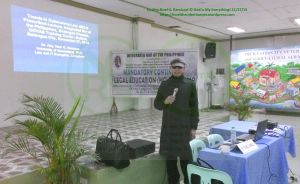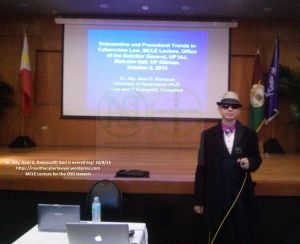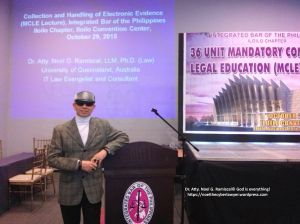Ever vigilant of cyber law issues that could impact the rights and interests of Philippine citizens who are netizens, Dr. Atty. Noel G. Ramiscal has presented lawyers and law students in his Mandatory Continuing Legal Education (MCLE) lectures and recently concluded lecture tours of three universities in Cebu an important legal issue that could catalyze into a case of first impression:
Did the 2012 Philippine Cybercrime Prevention Act (R.A. 10175) passed in 2012 become effectively implementable with the promulgation of its Implementing Rules and Regulations (IRR) and its later deposit with the University of the Philippines Office of the National Administrative Register (UP ONAR) three years after its passage?
Dr. Atty. Noel G. Ramiscal first expounded on this issue in his MCLE lecture on the “Substantive and Procedural Developments in Cybercrime Law” for the Office of the Solicitor General (OSG) lawyers last October 8, 2015 at the Malcolm Hall, UP Law Center. He also did the same for the Integrated Bar of the Philippines (IBP) Iloilo Chapter last October 29, 2015, at the Iloilo Convention Center; for the IBP Nueva Ecija Chapter last November 12, 2015 at the Rico Fajardo Hall, NEUST, Sumacab, Cabanatuan; for the IBP Batangas Chapter last November 27, 2015 at the OCVAS Training Center in Bolbok; for the lawyers who attended his MCLE lecture last December2, 2015 at the UP Law Center, Penthouse, Diliman; as well as in his lectures for the law schools of the University of Cebu (November 18, 2015), the University of San Carlos (November 19, 2015) and the South Western University (November 20, 2015).
R.A. 10175 was approved last September 12, 2012. It specifies the mandatory action that will give rise for its implementation, thus:
Section 28. Implementing Rules and Regulations. — The ICTO-DOST, the DOJ and the Department of the Interior and Local Government (DILG) shall jointly formulate the necessary rules and regulations within ninety (90) days from approval of this Act, for its effective implementation.
If the named agencies followed the mandate of the law, they should have released the IRR at the latest by January of 2013. But they did not.
For those who remember their Philippine Administrative Law, and have done research on the full extent of legal due process via “notice” of the law to the general public, they would know that the full effective implementation of any law would only commence from the time the required certified copies were deposited with the UP ONAR at the U.P. Law Center which usually follows after they have been published in the Official Gazette or newspapers of general circulation. ONAR was established to fulfill the requirement under Section 3 of Book VII of the Administrative Code of 1987 which requires every agency in the Government to file three (3) certified copies of every rule (that includes Implementing Rules and Regulations) adopted by it with the University of the Philippines Law Center.
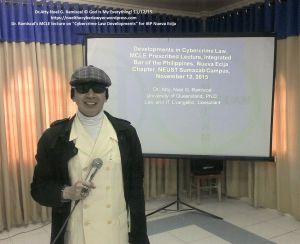
Dr. Atty. Noel G. Ramiscal’s lecture on developments in Cybercrime Law for IBP Nueva Ecija, Nov. 12, 2015
Dr. Ramiscal was able to get a certified copy of all the pages of the R.A. 10175 from the UP ONAR last September 24, 2015. Such certified copy revealed that the certified copies of the IRR were actually deposited with the U.P. ONAR last September 21, 2015.
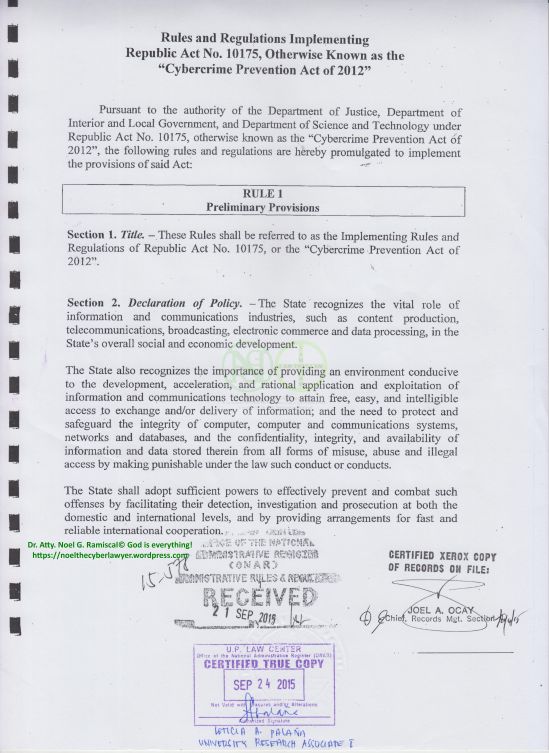
First page of the IRR of R.A. 10175 certified by UP ONAR, secured by Dr. Atty. Noel G. Ramiscal, September 24, 2015
Be that as it may, let’s go back to the question, is R.A. 10175, truly effectively implemented with the late passage of its IRR by three years?
The jurisprudence on implied repeals generally center on either the irreconcilability of two laws, or where the legislature intended one law to substitute an earlier law. Neither is applicable to this matter.
In this case, however, one must look at the directive of Section 28. The operative word in this section relative to these three agencies is the word “shall” which under the rules of statutory construction denotes an imperative act to be done within the specified timeframe.
One could then argue and for good substantial reasons that the Philippine Cybercrime Prevention Act had already been impliedly repealed by the inaction of the concerned agencies for almost three years beyond the legal ninety day period wherein they were supposed to formulate the IRR. They were remiss in their legal duty of observing the time frame. Plus, the lengthy period of their inaction hardly seems reasonable.
The filing of the required copies with UP ONAR is crucial because each rule as provided in Section 4, Book VII of the Administrative Code shall become effective fifteen (15) days from the date of filing with the UP Law Center “unless a different date is fixed by law, or specified in the rule in cases of imminent danger to public health, safety and welfare, the existence of which must be expressed in a statement accompanying the rule”.
But the fact is, R.A. 10175 based its “effective implementation” on the passage of the IRR. Furthermore, there is no statement in the law itself being effectively implemented without the IRR due to any “imminent danger to public health, safety and welfare”.
Moreover, there is also no proviso that offered an alternative way for the law’s effective implementation despite the agencies’ inaction or unreasonable delay. Unlike Republic Act No. 9211, the Tobacco Regulation Act, June 23, 2003, which provided:
Section 37. Implementing Rules. – The IAC-Tobacco shall promulgate such rules and regulations necessary for effective implementation of this Act within six (6) months from the date of publication of this Act. The said rules and regulations shall submitted to the COC- Tobacco for its review. The COC-Tobacco shall approve the implementing rules and regulations within thirty (30) working days of receipt thereof: Provided, That in the event the implementing rules and regulations are not promulgated within the specified period, the specific provisions of this Act shall immediately be executory…
R.A. 10175 did not cover the circumstance when the agencies tasked with the important function of creating the IRR would not fulfill their duty within the timeframe set by the law.
One can take notice of the fact that the law underwent constitutional challenges which was resolved by the Supreme Court in an en banc decision in February 2014 which upheld the constitutionality of most of the law’s questioned provisions. This contingency is neither a legal impediment nor a legal excuse for the involved agencies not to have come up with the IRR within the stipulated time stated in the law. The fact that the Supreme Court ruled unconstitutional certain provisions of the law (e.g. the criminalization of spamming, the real time collection by police enforcement agents of “traffic data” upon their own determination of “due cause”, etc.) would not diminish the responsibility of these agencies in coming up with the timely and necessary IRR, since the affected rules could be amended later on to reflect the Supreme Court’s ruling.
These agencies also involved certain entities in its consultative process conducted last 2014, in order to come up with the IRR. But this consultation process which was not expressly sanctioned under the law, was done two years after the law was already passed. And even with this consultation, it took these agencies more than a year to finally release the IRR.
This is a matter that deserves judicial scrutiny. The judiciary must weigh all the factors bearing in mind that if they decide to excuse this, that would give all the more reason for government agencies to flout their power, and the judiciary would give the impression that they are authorizing these agencies’ irresponsibility and approve their non-observance of laws that they are meant to implement!
In all his lectures, Dr. Ramiscal has asked audiences of their stand on this issue. To those who believed that the Cybercrime Prevention Act is effectively implemented despite of what was NOT done by these agencies, they cannot come up with a clear articulate legal reason to support their position.
Even with the Supreme Court’s 2014 en banc ruling on some of R.A. 10175’s provisions, the law still contains legally objectionable features which had not been the subject of any petition, that if implemented, will certainly have deleterious effects on the legal rights of Philippine citizens, particularly those accused of cybercrimes, and telecommunication, internet and service providers, the details of some of which, were elucidated upon by Dr. Ramiscal in his lectures.
To those defense lawyers whose clients are the subject of pending cybercrime cases, who have come up to Dr. Ramiscal and asked his opinion, he has always said that this issue should be the preliminary question they should raise in their clients’ defense. In one of his dinners after his lectures, he was fortunate enough to discuss this issue with the powerhouse couple of Atty. Daryl Largo, a big-time legal practitioner in Cebu, and Atty. Joan Largo, who is currently the Dean of the University of San Carlos, and who represented the St. Theresa’s College (STC) in the now famous Vivares v. STC case.

Dr. Atty. Noel G. Ramiscal with mom, the University of San Carlos power couple Atty. Daryl and Joan Largo and two USC student leaders
As always, Dr. Ramiscal would like to express his immense gratitude to the OSG, the UP IAJ, the IBP Iloilo Chapter, the IBP National, the IBP Nueva Ecija and IBP Batangas, for giving him this opportunity to present his views and insights on the state of cybercrime law in the Philippines. Utmost thanks goes out to Atty. Maricar Villanueva Hiballes, the beautiful and gracious IBP Iloilo Chapter President, the IBP Iloilo staff, the UP IAJ staff, and the wonderful and generous IBP Iloilo lawyers who truly welcomed Dr. Ramiscal!

Dr. Ramiscal dining with the elegant IBP Iloilo Pres. Atty. Hiballes, the lovely (ret) Judge Pison, and the wonderful staff of UP IAJ, SC and IBP Iloilo, Oct. 28, 2015
Grand thanks to the debonair and accommodating Atty. Bembol Castillo,
the IBP Nueva Ecija Chapter President, the IBP Nueva Ecija staff, Ms. Elisa Cruz, Mr. Joey Pastor (the SC monitor), and the kind and lively IBP Nueva Ecija lawyers!Utter gratitude to the IBP Batangas President, Atty. Erwin Aguilera, and its Board of Directors,
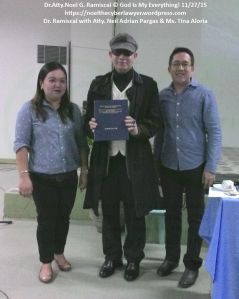
Dr. Atty. Noel G. Ramiscal receiving a certificate of appreciation from IBP Batangas Atty. Pargas and staff, Ms. Aloria, Nov. 27, 2015
One of the best privileges of doing this tour is meeting and connecting with fellow MCLE lecturers like the marvelous Judge Charito Macalintal Sawali, and the brilliant Atty. Erickson H. Balmes (a man of many talents), with whom Dr. Ramiscal and his mom had several breakfast sharings. Greatest appreciation to Atty. Balmes,
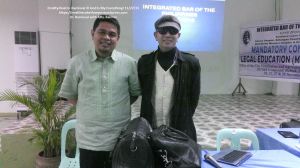
Dr. Atty. Noel G. Ramiscal with fellow MCLE lecturer, Atty. Erickson H. Balmes, IBP Batangas, Nov. 27, 2015
Dr. Ramiscal also acknowledges the vital partnerships the IBP Cebu Chapter (through its Board of Directors, its President, Atty. Malig-On, Jr., and its Treasurer, Atty. Misal Martin) established with the University of Cebu, the University of San Carlos and the South Western University, that allowed Dr. Ramiscal to share some of his knowledge, experience and fruits of his research with the wonderful and appreciative law students of these universities! God Thanks to all of you!

